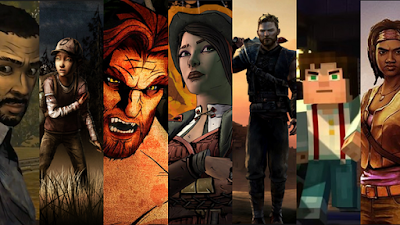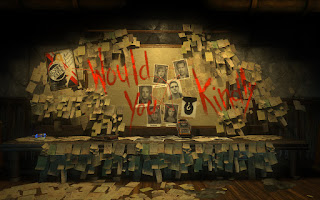5 More Studios Microsoft Should Acquire
5
More Studios Microsoft Should Acquire
Microsoft shocked the entire industry this
year at E3, after announcing 5 new first-party studios: The Initiative,
Playground Games, Undead Labs, Ninja Theory and Compulsion Games. This is
undoubtedly a result of Phil Spencer’s (Head of Xbox) promotion to the Senior
Leadership Team of Microsoft giving him more power and an increased budget. But
this news is exciting for Xbox fans as it shows Microsoft is building up
to a dominant next-generation and listening to fan’s concerns about the quality of
their first-party studios, especially after the success that both Sony and
Nintendo have been having with their exclusives over the past two years. Phil
Spencer has said in interviews that the new studios they announced at this year’s
E3 weren’t thought about as the end of their work when it comes to expanding
their studios. With that in mind lets jump into who else Microsoft could
acquire in the years ahead.
TellTale Games
TellTale might not make blockbuster titles
on the levels of God of War or Halo, but there’s no other single developer
better fitted to release their games on Xbox Game Pass, Microsoft's subscription service. TellTale almost always
has a season of one of their games currently being released or about to begin, making them the perfect developer to keep players subscribed to Game Pass as
they’re eagerly anticipating new episodes of their on-going games. Even though
TellTale’s games don’t have the production values of a first-party exclusive,
the big brands they attract to license would certainly be valuable to advertise
Xbox bundles with; sizzle reels including big names like ‘Stranger Things’,
‘Game of Thrones’ and ‘Batman’ are sure to turn heads.
How
likely is this to happen?
With 25% of TellTale’s workforce suffering
from lay-offs last November and TellTale admitting they’re a “company already
under financial strain” following a lawsuit from a co-founder, it’s clear that
TellTale’s current structure isn’t working for them. TellTale’s much more
likely to accept an acquisition while they’re under financial instability and
we’ve already seen they have a tight relationship with Microsoft after
releasing two seasons of ‘Minecraft: Story Mode’, owned by Xbox. The increased
support and funding from Microsoft could lead to some of TellTale’s
biggest problems such as frame rate issues and lengthy gaps between episodes
becoming non-existent.
Moon Studios
With the critical acclaim and commercial
success of 2015’s ‘Ori and the Blind Forest’, it was no surprise to see
Microsoft green light a sequel due out next year. It’s arguable that Moon’s
position as a decentralized team makes them less valuable or desirable as a
first-party studio, but it’s impossible to ignore that they’ve been able to
attract some of the finest metroidvania developers. It’s questionable whether
or not ‘Ori’ has the potential to become a franchise since even the first game
felt more like a one off, but Xbox is in dire need of new IPs so letting Moon
continue to create new worlds wouldn’t be a bad idea. Furthermore, taking cues
from the granddaddy of platformers, Super Mario, and either reinventing ‘Ori’
or taking it into 3D doesn’t seem like bad ways to expand the franchise.
How
likely is this to happen?
As much as I love ‘Ori’ the chances of Moon
accepting an acquisition are low. The studio’s given the impression in
interviews that they like their independence (to be fair Ninja Theory gave the
same impression too) and if this acquisition were to happen, it would’ve
happened at this years E3 in preparation of ‘Ori and the Will of the Wisps’
release.
Playtonic Games
Playtonic Games, made up of former Rare
developers, came together for one reason in 2015, to crowd fund the game
they’ve wanted to make since the golden era of Rare: a ‘Banjo-Kazooie’
spiritual successor. Despite record-breaking success on Kickstarter to fund
their game, ‘Yooka Laylee’, the critical reception to it was less than stellar.
Most of the criticism came from the game’s frustrating camera, bad controls and
inconsistent level design. It’s evident from all of this that the demand for a
throwback 3D platformer is there, it’s the lack of resources, time and funding
that the team lacked.
Mario has bafflingly been the only AAA
platformer for the past few generations and with the recent success of the
Crash Bandicoot remakes it seems like the perfect opportunity for Microsoft to
bring back the iconic bird and bear with the developers who originally created
them. Rare might be one of the most historic developers in the industry but the
truth is that that team isn’t what it use to be and is probably not equipped to be
developing a platformer. There’s also a severe lack of other studios making 3D
platformers; leaving Playtonic as the natural choice to revive ‘Banjo-Kazooie’.
How
likely is this to happen?
3 of the 5 new first-party developers Xbox
announced at their E3 conference have been mid-tier developers with Compulsion
Games employing only 40 people. Playtonic Games is similarly small making them
both a cheap acquisition and perfectly in-line with what Microsoft has been
doing. Unless the studio has aspirations for a different style of game I’d bet
this ones pretty likely if Microsoft came knocking.
Mistwalker
Founded in 2004 by famed ‘Final Fantasy’
creator Hironobu Sakaguchi with the financial backing of Microsoft, Mistwalker
originally began by making two traditional JRPGs exclusive to the Xbox 360,
Blue Dragon and Lost Odyssey. Both received positive reviews and commercial
success and have continued to gain somewhat of a cult following. But despite
their successes Mistwalker went on to make smaller DS games, and eventually
mobile games, shrinking to a team of about 15 employees as of last year. Since
the downfall of ‘Fable’, Xbox has been missing a big, exclusive RPG, and has
struggled to gain Japanese support since the first Xbox. An acquisition and
expansion of Mistwalker could help in both ways, as well as giving them
boasting rights by having an iconic Japanese developer leading a first-party. An
acquisition of a Japanese developer would also make them and Sony the only publishers to
have first-parties in Europe, North America and Japan.
How
likely is this to happen?
The breakout commercial success of
full-priced turn based JRPG ‘Octopath Traveler’ and Microsoft’s reinvestment to
get more Japanese games on the Xbox might make this more likely but as much as
I want to will this into existence, this acquisition doesn’t seem likely any
time soon. Microsoft have tried before to get a foothold into Japan and failed;
this doesn’t mean that Western audiences aren’t interested in Japanese games
but it just means there isn’t going to be enough talented developers in Japan
to come together and make an Xbox exclusive, although Sakaguchi’s pull might be
significant enough.
Remedy Entertainment
Remedy’s relationship to Microsoft as a
second party studio goes as far back as at least 2005 while the classic survival action
game, ‘Alan Wake’, was in development. Released to sales as high as 3.2 million
and incredible critical reception, ‘Alan Wake’ is one of the more wanted games
to get a sequel. Remedy’s next Xbox exclusive ‘Quantum Break’ failed to
generate excitement resulting in poor sales and having nowhere near the adoration
that Remedy’s last game had. Despite this Remedy has proven they can make
successful, ambitious and most importantly, quality single-player games to
combat Sony’s onslaught of story-driven exclusives. Plus, an announcement of a
sequel to ‘Alan Wake’ is guaranteed to excite Xbox fans.
How
likely is this to happen?
A year or two ago I would have said Remedy
would be the first developer in line to be acquired by Microsoft. But with the
underwhelming impact of ‘Quantum Break’ and Remedy’s decision to debut their
new game, ‘Control’, on Sony’s stage this year at E3, an acquisition doesn’t
seem like an eventuality at this point. Remedy has expressed desires to make a
sequel to both ‘Alan Wake’ and ‘Quantum Break’, but those sequels would be
entirely dependent on Microsoft’s cooperation, meaning an acquisition isn’t outside the realm of possibility; just maybe after ‘Control’.











Comments
Post a Comment